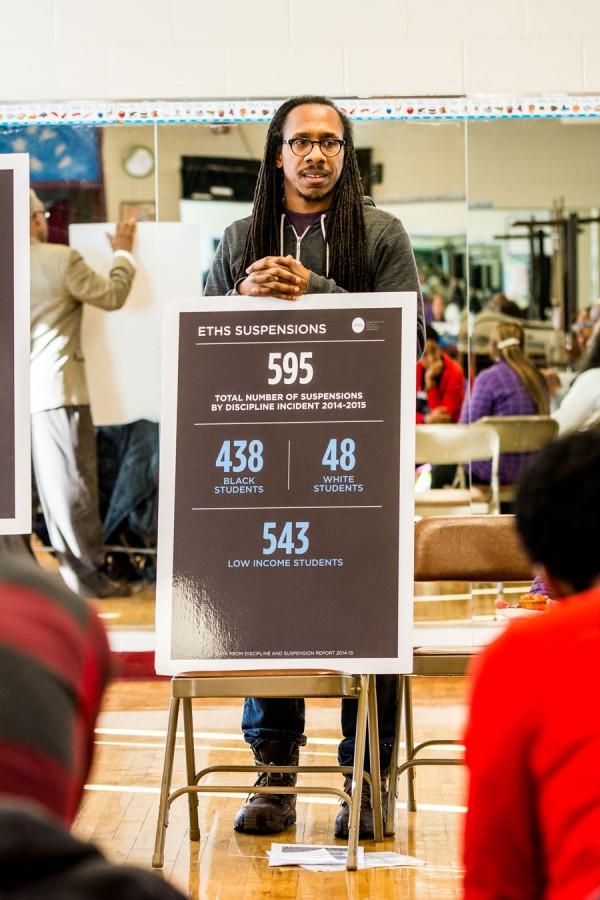Evanston celebrates Dr. King’s legacy at Fleetwood-Jourdain Community Center
Sam Schumacher/The Daily Northwestern
The Fleetwood-Jourdain Community Center hosted a Day of Celebration honoring Martin Luther King, Jr.’s life and legacy on Saturday. The events included a ceremony and community discussion, both of which explored the state of race relations in modern society and the arts.
January 18, 2016
Evanston residents celebrated the legacy of Dr. Martin Luther King, Jr. through song, dance, speech and conversation Saturday at the Fleetwood-Jourdain Community Center.
The Fleetwood-Jourdain Community Center, 1655 Foster St., organized two events to honor King’s life and work, the first of which was a ceremony featuring performances and speeches from members of the Evanston community. More than 125 city residents, including Mayor Elizabeth Tisdahl and State Rep. Robyn Gabel (D-Evanston), came together to reflect on King’s life and ongoing racial tensions in the country.
“When we celebrate Martin Luther King, we are celebrating more than Martin Luther King,” said former Evanston mayor Lorraine H. Morton at the ceremony. “We’re celebrating all the people — even people here in Evanston — who got on that bus and went to Selma.”
The ceremony featured performances from various Evanston youth, including The Evanston Children’s Choir and the Evanston Dance Ensemble. Attendees praised the youth performances, saying their involvement symbolizes how important it is for younger generations to understand and learn from King’s legacy.
“The young people should know the history, how far we’ve come and how far we have to go,” said Evanston resident Brenda Grier, who said she tries to attend all of the city’s events celebrating King.
A community discussion titled “King, Race, and the Arts” followed the ceremony and allowed residents to explore the influence of King and other Civil Rights leaders on modern racial relations. The discussion was hosted by members of the Evanston Arts Center along with representatives from Fleetwood-Jourdain Theatre, Making Evanston Equitable Together, Insight Arts and Black Lives Matter Chicago.
Much of the discussion centered around unequal representation of black art. Some community members argued that work produced by black artists was not presented or displayed as much as work made by white artists.
“I think we have to shift it that black art and black plays are Americana,” said Dr. Melissa Blount, an Evanston-based psychologist and cofounder of MEET. “That is America — it’s not a separate story.”
Although the premise of the community discussion was to examine inequalities in the arts and King’s influence, the participants delved into a variety of topics, including strategies for increasing the voting rate among minorities and limiting police violence toward the black community.
Participants also spent a significant portion of the discussion on the pervasiveness of what the discussion leaders referred to as nonviolent “white supremacy” in American culture. They explored the idea of “racism without racists,” which posits that racism is not always presented in the form of bigoted treatment from individuals, but is intrinsic in a social system that itself is unequal and prioritizes the needs of whites.
“Part of white supremacy is not recognizing that you have the choices that other people do not have,” said Lesley Williams, head of adult services at Evanston Public Library.
Several participants called for further education about the black experience for white people in America in hopes that it will lead to greater understanding of how racism works in modern society.
“My goal is to get people into the room to talk point by point about reclaiming King and talking about … how King was making connections and to model that with the connections we can make in our given fields,” Keith Brown, director of education for the EAC and facilitator of the discussion, told the Daily. “I think there was some great dialogue and great exchanges.”
Participants at both events discussed how King had been an inspiration in their personal lives. Rev. Dr. Gessel Berry Jr., the pastor of Sherman United Methodist Church, 2214 Ridge Ave., said he was influenced by King as he began his theological degree at Garrett Evangelical Theological Seminary in September 1968, a few months after King was assassinated.
Berry, who was the keynote speaker for the ceremony, said he learned the importance of love, power and justice from King.
“Dr. King said let justice roll down like righteousness,” Berry said. “He said he was a drum major for justice and that’s what we need to do and to be today. All we have to do is stand up.”
Alexis Harris, a child actress involved in the Fleetwood-Jourdain Theatre, read an excerpt from King’s last speech at the ceremony and said she is influenced by King’s words and actions.
“Taking the time to celebrate Martin Luther King’s legacy is important to me,” Harris said. “His life has changed my life, his words have changed my words and his heart has changed my heart.”=
Email: [email protected]
Twitter: @noracshelly


